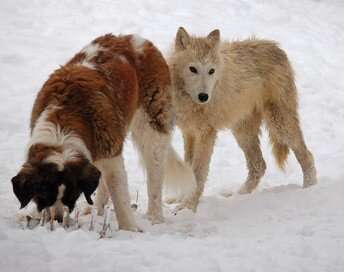#Domestication and industrialisation lead to similar changes in gut microbiota

“#Domestication and industrialisation lead to similar changes in gut microbiota”

Domestication has a consistent effect on the gut microbiota of animals and is similar to the effects of industrialisation in human populations, with ecological differences such as diet having a strong influence.
These findings, published today in eLife, highlight how the flexibility of the gut microbiota can help animals respond to ecological change and could help identify ways of manipulating gut microbial communities in the service of health.
Animals typically have complex communities of microbes living in their gut that can strongly influence functions such as immunity and metabolism. These communities can be extremely diverse and differ greatly between species and even individuals. We know, for instance, that domesticated animals, such as lab mice, have different gut microbial communities than their wild relatives. We have even seen large changes in the gut microbiota of industrialized human populations, some of which have been linked to the rise of certain diseases.
During domestication, animals experienced profound ecological changes that likely shaped their gut microbiota. “Domesticated animals and industrialized human populations potentially experienced similar ecological changes such as less diverse, more easily digestible diets, higher population densities, and more medical interventions,” explains first author Aspen Reese, who was a postdoctoral Junior Fellow in the Society of Fellows, Harvard University, US, at the time the study was carried out, and is now Assistant Professor at the University of California, San Diego, US. “We wanted to find out if domestication had consistent effects on the gut microbiota of animals and if the effects were indeed similar to those of industrialisation in humans.”
To assess the effects of domestication, the team sequenced and compared microbial DNA extracted from fecal samples of 18 species of wild and domesticated mammals. They found that domestication did have a clear global effect on gut microbiota, although the specific differences depended on the species.
Domestication involves strong selection pressure on animals, leading to important genetic and physiological changes that may also affect gut microbial communities. To unpack the relative roles of ecology and genetics, the team then swapped the diets of wild and domesticated animals. They found that the gut microbial communities of related animals, such as wolves and dogs, became much more similar to one another, supporting the idea that altered diets explain at least some of the changes in the gut microbiota seen with domestication.
To understand whether such differences also occur in humans, they then compared the gut microbial communities of humans to those of chimpanzees, one of our closest living relatives, and between humans living in industrialized versus non-industrialized populations. They found that differences between the gut microbiota of humans and chimpanzees were similar to those seen between domesticated and wild animals, with the largest changes evident in industrialized populations. Because all humans are equally related to chimpanzees, these results showed that ecological factors rather than genetics drive aspects of the gut microbiota shared between domesticated animals and humans living in industrialized populations.
“Our research highlights that the flexibility of the gut microbiota likely helps animals and humans respond to rapid ecological change,” concludes senior author Rachel Carmody, Assistant Professor in the Department of Human Evolutionary Biology at Harvard University. “But, at the same time, this flexibility can create opportunities for mismatch between the gut microbiota we have and the one our bodies have evolved to expect. As we increasingly appreciate the central role of the gut microbiota in biology, understanding the factors that shape it in animals and humans may help us identify new ways to improve experimental animal models, the wellbeing of animals we depend on, and ultimately, human health.”
Living environment affects the microbiota and health of both dogs and their owners
Aspen T Reese et al, Effects of domestication on the gut microbiota parallel those of human industrialization, eLife (2021). DOI: 10.7554/eLife.60197
Citation:
Domestication and industrialisation lead to similar changes in gut microbiota (2021, March 23)
retrieved 24 March 2021
from https://phys.org/news/2021-03-domestication-industrialisation-similar-gut-microbiota.html
This document is subject to copyright. Apart from any fair dealing for the purpose of private study or research, no
part may be reproduced without the written permission. The content is provided for information purposes only.
If you liked the article, do not forget to share it with your friends. Follow us on Google News too, click on the star and choose us from your favorites.
For forums sites go to Forum.BuradaBiliyorum.Com
If you want to read more Like this articles, you can visit our Science category.




